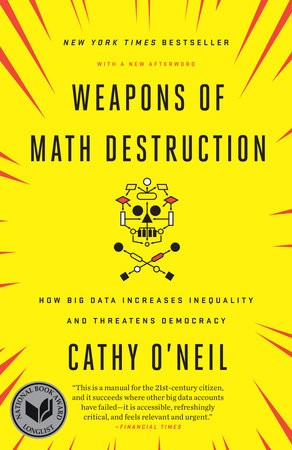
In an age where data reigns supreme, it has become a driving force in decision-making for businesses, governments, and individuals. However, its power is not without peril. In her 2016 book, Weapons of Math Destruction: How Big Data Increases Inequality and Threatens Democracy, Cathy O’Neil coined the term “Weapon of Math Destruction (WMD)” to highlight the dark side of data-driven decisions. In this context, WMDs aren’t bombs or biological weapons, but rather algorithms that perpetuate social inequality and undermine democratic values.
This article will explore O’Neil’s Weapons of Math Destruction concept, focusing on how big data exacerbates inequality and its dangers to democratic systems.
What is a Weapon of Math Destruction in the Digital Age?
In Cathy O’Neil’s terminology, a Weapon of Math Destruction (WMD) refers to algorithms and data models that harm society in three key ways: they are widespread, opaque, and destructive. These systems, often deployed in education, criminal justice, and finance, can have far-reaching, adverse effects when designed without consideration for fairness or transparency.
Key Characteristics of WMDs:
- Scale: WMDs are applied to vast populations, making decisions that affect countless people.
- Opacity: These algorithms operate in a “black box,” where the public cannot easily understand or challenge their decision-making processes.
- Destructive Feedback Loops: The results of these systems often reinforce existing inequalities, creating a self-perpetuating cycle of harm.
Cathy O’Neil emphasizes that while these algorithms are often portrayed as neutral or objective, they are anything but. The data used to build these models is riddled with historical biases, and the lack of transparency means affected individuals have little recourse.
The Role of Big Data in Exacerbating Inequality
Big data has the potential to offer new insights and help make more informed decisions. However, in Weapons of Math Destruction, O’Neil demonstrates how its misuse can deepen societal divides. Algorithms designed to optimize processes—such as hiring, loan approvals, or teacher evaluations—frequently rely on biased datasets, leading to skewed outcomes that disproportionately affect marginalized groups.
Example: Education as a WMD
One of O’Neil’s most striking examples is the use of algorithms in education. In many schools, teachers are evaluated using student test scores. While this seems like an efficient solution, it has problematic consequences:
- Teacher Evaluations: Test scores are influenced by various external factors, such as socioeconomic background and access to resources, which are beyond a teacher’s control. As a result, teachers in low-income areas may be unfairly penalized, reinforcing the existing inequities in the education system.
- Student Admissions: Similarly, universities increasingly use algorithms to screen applicants. These models often disadvantage students from underrepresented backgrounds, leading to a loss of diversity and perpetuating the cycle of inequality.
Such cases illustrate how data-driven systems when applied without ethical oversight, can perpetuate the very inequalities they are supposed to address.

How Algorithms Threaten Democracy
Beyond individual impacts, Cathy O’Neil argues that WMDs also pose a broader threat to democratic institutions. Algorithms now influence vital decisions affecting entire populations, such as who gets hired, how law enforcement resources are distributed, and even which political ads we see.
Policing and Criminal Justice
Algorithms are increasingly used in law enforcement through tools like predictive policing, which aims to anticipate crime based on historical data. However, when the input data reflects past bias—such as the over-policing of minority communities—the algorithm perpetuates these patterns. This can lead to an over-allocation of resources in certain areas, further marginalizing vulnerable populations.
Another example lies in the criminal justice system, where algorithms are used for risk assessment in sentencing and parole decisions. These systems often consider factors like an individual’s zip code or income level, which can result in harsher punishments for low-income or minority individuals. The so-called objectivity of these models hides the fact that they can reinforce existing social biases.
Algorithms and Elections
The rise of micro-targeting in political campaigns is another area where algorithms can threaten democracy. Data models allow campaigns to tailor specific messages to individual voters, often deepening divisions and amplifying polarization. This undermines the concept of a shared public discourse, a cornerstone of healthy democratic systems.
O’Neil highlights that when decisions about law enforcement, elections, and even job opportunities are made by opaque algorithms, it becomes harder to hold anyone accountable. The result is a democratic system that is increasingly influenced by forces that are difficult to scrutinize or challenge.
Cathy O’Neil’s Call for Ethical Data Practices
In Weapons of Math Destruction, Cathy O’Neil doesn’t just diagnose the problem—she calls for solutions. Her primary focus is increasing transparency and accountability in developing and deploying algorithms.
Proposed Solutions:
- Algorithmic Transparency: Individuals affected by algorithms should have the right to understand how decisions are being made. This means making the processes behind these models clearer and easier to access.
- Auditing and Regulation: O’Neil advocates for independent audits of algorithms to detect and correct bias. Regulatory frameworks are necessary to ensure that harmful algorithms are either reformed or removed.
- Ethics in Data Science: Data scientists and engineers must prioritize ethics when designing systems. They should consider the potential societal consequences of their models and work to eliminate biases in the data.
By pushing for accountability, O’Neil emphasizes the need for a future where data-driven technologies are used to reduce inequality rather than reinforce it.
Conclusion: A Call to Action for the Future of Data
Cathy O’Neil’s Weapons of Math Destruction serves as a critical warning about the dangers of unchecked algorithms in modern society. As big data continues to play an increasingly central role in decision-making, it is essential to question the fairness and transparency of these systems. Left unchecked, these WMDs will only deepen existing inequalities and erode democratic institutions.
To prevent this, we must prioritize ethical practices in data science and ensure that algorithms are held to the same accountability standards as other powerful tools. Only then can we harness the true potential of big data to create a more equitable and just society.
By addressing these concerns, we can transform these Weapons of Math Destruction into forces for good—empowering people, promoting fairness, and strengthening democracy.
